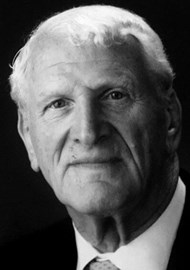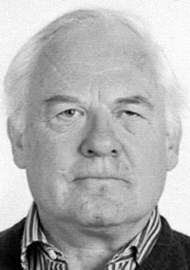In a series of interviews, former Chairman of the Editorial Board for ENT & audiology news, Professor Patrick J Bradley, speaks with eminent otolaryngologists who have retired (or are about to retire) from practice. Our first is with Professor Gene Myers, Chairman and Chief from Pittsburgh School of Medicine, who forged international connections involving partnership and education, on behalf of the American Academy of Otolaryngology Head and Neck Surgery. He has mentored and educated numerous ORL-HNS departmental chairpersons and chiefs through the world. Many of these countries he has travelled accompanied by his wife, Barbara. We wish them a long, happy and fruitful retirement!
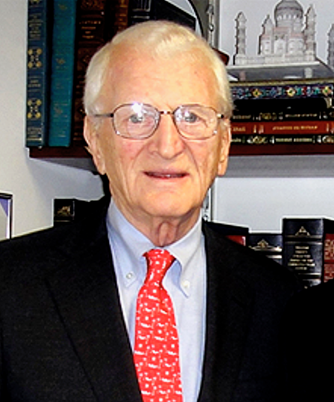
Professor Eugene Myers, FACS, FRCS Edin (Hon).
In 2006, I stepped down after 33 years as Chairman of the Department of Otolaryngology at the University of Pittsburgh School of Medicine.
I did not retire, although I think many equated stepping down with retiring. Since then I have worked the same crazy 12 hour days, although they were configured differently. I still see patients one day a week and the rest of the week is mine. During these years, I have authored three books and am currently working on a six volume book entitled Master Techniques in Otolaryngology – Head and Neck Surgery. In addition, since I stopped operating a few years ago and no longer have a heavy patient load or administrative responsibilities, I have taken on a number of responsibilities in civilian life, including being the President of the Opera Theater of Pittsburgh, being a member of the board of directors of the Pittsburgh Athletic Association, the Eye and Ear Foundation, the President of our Condominium Association, and the chairman of a committee in the Western Pennsylvania Conservancy. In addition to all the travelling, you can see it keeps me pretty busy.
Despite the fact that my grandfather was a Russian immigrant who became a family doctor in South Philadelphia, and my father was Chairman of the Department of Otolaryngology at Temple University Medical School, and my three uncles were in dermatology, radiology and orthopaedics, I did not think I wanted to be a doctor.
However, in the mid ‘50s my dad watched Dr Sam Rosen’s stapes mobilisation procedure which allowed people with otosclerosis to be able to hear again and began to do this surgery. I watched him restore the patients’ hearing which to me seemed like a miracle and inspired me to go into medicine. Another source of inspiration for me to do this was meeting my soon to be wife, Barbara, who was a student nurse who introduced me to the house staff at her hospitals which reassured me that they were not any smarter than I was and I could handle the academic challenge of medical school. After graduating from Temple Medical School in 1960, I did an internship at Mount Sinai Hospital in New York and then a residency in otolaryngology at Massachusetts Eye and Ear Infirmary – Harvard Medical School. We were adopted by several old Boston families and had a spectacular life in Boston. In addition to Harold Schuknecht who had just been appointed department chairman, the other faculty included William Montgomery and Michael Paparella. As a resident, I spent a considerable amount of time in their faculty clinic and was inspired to pursue a career in academic otolaryngology.
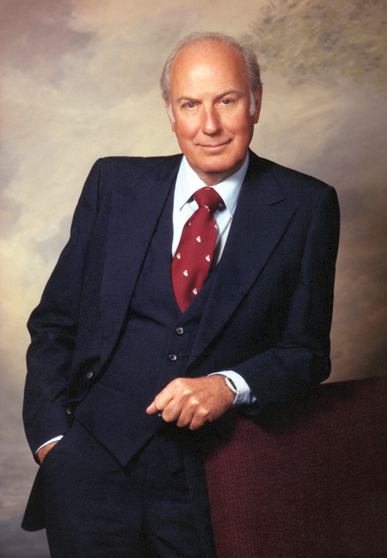
Harold Schuknecht.
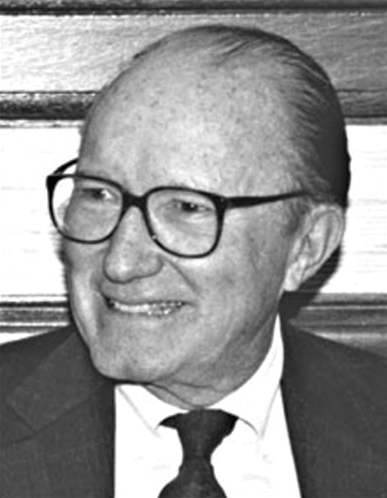
William Montgomery.
Upon completion of my residency, I became a captain in the United States army and spent two years as an otolaryngologist in the 97th General Hospital in Frankfurt, Germany. This was a great experience in the process of the maturation of a surgeon that was unsurpassed, as it was the first time that I had full responsibility for the care of my own patients. It also enabled me to travel with my family throughout Europe which was a game changer since we had never previously been out of the United States.
After my army obligations were completed, I was fortunate enough to spend a year as a Special Fellow in Head and Neck Oncologic Surgery with Dr John Conley. I thought of myself as being a ‘sorcerer’s apprentice’. He was a remarkable surgeon and a remarkable individual and was a great source of inspiration for me throughout my career. Once I was well into that year, I knew that I could never go back to practising other aspects of our field, and the rest of my career has been spent as a head and neck surgeon.
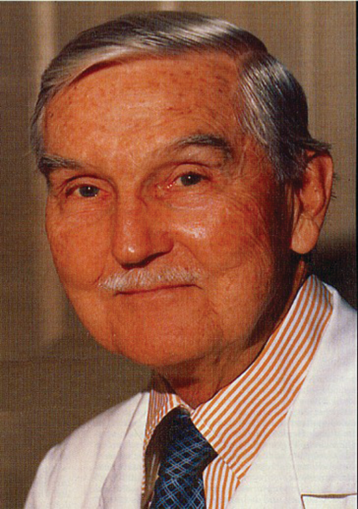
Dr John Conley.
After completing the fellowship, I returned to Philadelphia and four years later, in 1972, I was recruited to become Professor and Chairman of Otolaryngology at the University of Pittsburgh School of Medicine and Chief of the Department at the Eye and Ear Hospital of Pittsburgh. I was the first full-time academic faculty member. I went to the University of Pittsburgh because it had all the components that I felt that I needed to fulfil my ambition to build the best department of otolaryngology in the world. This included the Eye and Ear Hospital, a separate specialty hospital, but connected with the Presbyterian University Hospital, a general hospital, as well as the Children’s Hospital of Pittsburgh and the Veterans Administration Hospital. In addition to which it was the only medical school in the region and with a catchment area of approximately five million people. There was no head and neck surgery done within the medical centre and very little outside. Gradually I was able to recruit individuals such as Charles Bluestone who became the ‘father of paediatric otolaryngology’ and built a pre-eminent fellowship training programme which produced chiefs of paediatric otolaryngology units all over the world. In addition, he created a very important Otitis Media Research Centre which was very well funded by the National Institute of Health (NIH). I also recruited Jonas T Johnson who was my Vice-Chairman for many years and eventually succeeded me as Chairman.
Harold Schuknecht gave me excellent guidance when he heard that I had been appointed Chairman and said, “by all means do not do it the way I did it; I just wound up aggravating everyone and it caused a lot of trouble.” John Conley and my dad had nice words of support, but mostly I did it my own way by trying to carry out my vision, being imaginative and doing the best I could in the treatment of cancer of head and neck and being fair to what became a very large full-time faculty.
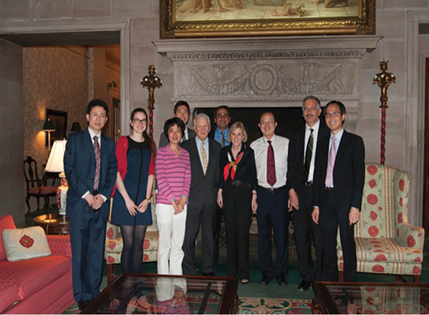
International Visiting Scholars, Department of Otolaryngology, University of Pittsburgh.
During my early days as Chairman of the Department of Otolaryngology at the University of Pittsburgh, I really did not seek any of these senior positions because frankly I did not know that they existed; however, as time went by and I was invited to lecture in the major meetings and became known, I was invited to work on various committees. In my first major assignment, I was selected by Bill Trible to be Secretary of the American Laryngological Association (ALA) which is one of the prestigious senior societies. I must say that I resurrected the ALA which had become somewhat petrified over the years and eventually became its President. I also had the privilege of serving as the President of the American Society of Head and Neck Surgeons, the American Academy of Otolaryngology – Head and Neck Surgery, the Pan-American Association of Laryngology – Head and Neck Surgery and the American Board of Otolaryngology. I had the good fortune following my presidency of the AAO-HNS to become the founding Coordinator for International Affairs, which was right up my alley, having been invited to lecture and operate all over the world. Barbara and I have now travelled together to 86 countries. I have travelled to many of these countries multiple times, for instance, I have been to Brazil 21 times both to operate and to participate in numerous meetings and courses.
I published my first several papers during my residency. One of the reasons for going to study with Harold Schuknect was my interest in temporal bone histopathology and my first 20 publications were on that topic.
My particular reason to be involved was my scientific curiosity and my good fortune in being able to make some original observations in the histopathology of the temporal bone. After my fellowship in head and neck surgery with Dr John Conley, I could not think of anything except head and neck surgery and most of my publications since that time are focussed on that subspecialty area. It is very difficult for clinicians in private practice to publish, but I think that those involved with academic medicine must publish or else they do not get promoted and then defect into private practice and we then lose some very good teachers. We are very proud of having provided a training ground for academicians and leaders in our specialty throughout the world. We have had more than 900 individuals from all over the world visit our department as International Visiting Scholars. Many of these individuals have gone onto leadership positions in their countries and there are many chairmen now who were part of our programme, both in the United States and overseas. Our faculty has risen to the occasion and all of them are very accepting of having international trainees with them, which they just see as part of their role as teachers. This has not taken a toll on the faculty and has not diluted the training of our fellows and residents.
The most significant contribution in my career was the concept of extracapsular spread (ECS) of cancer in the cervical lymph nodes.
My interest was stimulated by a lecture given by Professor Gordon Snow from Amsterdam in 1979 at the meeting of the American Society of Head and Neck Surgeons. The idea that ECS had a profound negative effect on the outcome of these patients was a new one in the United States, although it had been known in Europe. We found, as Dr Snow had indicated, that the use of radiation therapy did give some benefit for regional control; however, many of these patients still died from distant metastasis. My major contribution was to add chemotherapy following surgery and radiation therapy. We found in the initial group of patients, although these were not randomised or stratified, that the survival rate was much improved when chemotherapy was added. As the drugs were refined we went to a programme of concomittant chemoradiation following the surgery and found that the cure rate was enhanced and the treatment time was reduced considerably. Later Arlene Forrestiere from Johns Hopkins carried out prospective randomised studies which did, in fact, prove that our concept was correct. This has now become standard treatment for patients with extracapsular spread.
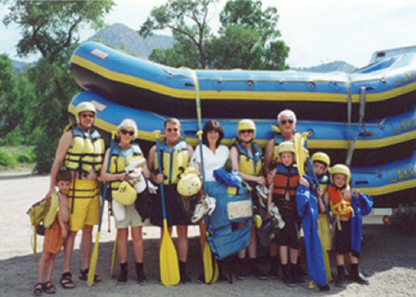
Dr Eugene Myers and family at Beaver Creek.
Don Harrison was the first of the leaders of otolaryngology in the United Kingdom who I met. We became very good friends and I visited him several times in the Royal Nose, Throat and Ear Hospital; and in fact, became acquainted with some of his trainees at that time from other countries, such as Randall Morton and Theo Gregor. He was a great role model and I marvelled at his leadership style. Of course, Patrick Bradley became a great friend of mine and we have also been together in many settings. We were lucky to have an Irishman like Bradley to come and provide leadership in otolaryngology in the UK and also participate in meetings in the US and become a corresponding member of the societies in our country. I was thrilled when he accepted my invitation to give the Eugene N Myers Lecture at the American Academy of Otolaryngology – Head and Neck Surgery in 2000.
Barbara and I were married just before I started medical school 57 years ago.
She has been a great companion and coach and the love of my life. Our oldest daughter, Marjorie, is married to Cary Fulbright, lives in San Francisco, and has two terrific sons. Alex graduated cum laude from the University of San Francisco and Chip is a sophomore at Georgetown University. Our son, Jeffrey Nicholas Myers, MD, PhD, is Professor of Head and Neck at the University of Texas MD Anderson Cancer Center. He is a terrific surgeon and has a very successful laboratory. He is married to Lisa and has three terrific sons; Keith who is a senior at the University of Michigan, Brett a freshman at St Andrew University and Blake who is a middle schooler.
I feel that being able to come out of a long, busy career in surgery and administration and major leadership roles with my family intact and all loving one another is the major achievement in my career.
As of July 1, 2014, I will be leaving the University of Pittsburgh to pursue other interests, including the creation of the Myers Family Foundation.
The mission of the foundation will be to support research in surgical innovation and the performing arts. My family will be playing a major role in this effort and we hope that this will give an opportunity to do some good in the Pittsburgh and the Western Pennsylvania community which has been so generous and supportive of me and to pay back for what this community has given me. It will also strengthen the strong bonds of our family and their families and provide sustainability for our foundation going forward.
Interview conducted by Prof Patrick J Bradley.

